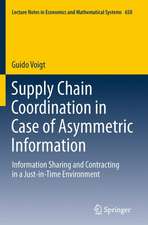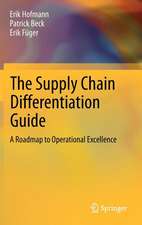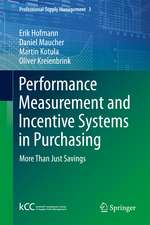Ways Out of the Working Capital Trap: Empowering Self-Financing Growth Through Modern Supply Management: Professional Supply Management, cartea 1
Autor Erik Hofmann, Daniel Maucher, Sabrina Piesker, Philipp Richteren Limba Engleză Paperback – 29 mai 2013
This book takes up the problem and shows ways of escaping the "trap" by identifying and strengthening in-house financing potential. First, different operating ratios will be introduced. These refer to the amount of capital committed to the flow of goods and to the amount of in-house financing possible. Subsequently, methods for consolidating in-house financing that are affected by procurement processes will be presented from the company's and the supply chain's perspective.
From a company's perspective, the methods for consolidating the amount of in-house financing over the following topics: The Management of Payment Terms, Inventory Management and Product Group and Supplier Management
From the supply chain's perspective, the following methods for extending the possible amount of in-house financing will be discussed: Finance-Oriented Supply Chain Sourcing, Supply Chain-Oriented Supplier Financing, Collaborative Cash-to-Cash Management, Collaborative Cash Pooling and Netting, Supply Chain Financing Platforms.
The conceptual models will be clarified using a practical example from the automobile industry. Finally, the "Procurement Value Added" (PVA©) approach will be presented, a concept that measures the contribution of procurement to the company's success.
| Toate formatele și edițiile | Preț | Express |
|---|---|---|
| Paperback (1) | 377.18 lei 6-8 săpt. | |
| Springer Berlin, Heidelberg – 29 mai 2013 | 377.18 lei 6-8 săpt. | |
| Hardback (1) | 382.95 lei 6-8 săpt. | |
| Springer Berlin, Heidelberg – 2 apr 2011 | 382.95 lei 6-8 săpt. |
Preț: 377.18 lei
Nou
Puncte Express: 566
Preț estimativ în valută:
72.17€ • 75.36$ • 59.60£
72.17€ • 75.36$ • 59.60£
Carte tipărită la comandă
Livrare economică 16-30 aprilie
Preluare comenzi: 021 569.72.76
Specificații
ISBN-13: 9783642267659
ISBN-10: 3642267653
Pagini: 104
Ilustrații: X, 94 p.
Dimensiuni: 155 x 235 x 5 mm
Greutate: 0.16 kg
Ediția:2011
Editura: Springer Berlin, Heidelberg
Colecția Springer
Seria Professional Supply Management
Locul publicării:Berlin, Heidelberg, Germany
ISBN-10: 3642267653
Pagini: 104
Ilustrații: X, 94 p.
Dimensiuni: 155 x 235 x 5 mm
Greutate: 0.16 kg
Ediția:2011
Editura: Springer Berlin, Heidelberg
Colecția Springer
Seria Professional Supply Management
Locul publicării:Berlin, Heidelberg, Germany
Public țintă
Professional/practitionerCuprins
Call for Action: From Financial and Economic Crisis to Working Capital Trap.- Determination of the Internal Financing Power of Corporate Growth via the Self-Financeable Growth Rate.- Strengthening Internal Financing Power using Cash-to-cash Cycle Optimization.- Measures for Strengthening Internal Financing Power from a Corporate Viewpoint.- Measures for Strengthening Internal Financing Power from a Supply Chain Viewpoint.- Case Study: Increasing Internal Financing Power of a Supplier in the Automotive Industry.- Measuring Procurement Contribution to Corporate Performance using the "Procurement Value Added".- Conclusion.- Summary.- Outlook.- Literature.
Notă biografică
The authors of this series are researchers of the University of St.Gallen, scientists of other leading international research centers with the focus on procurement and supply chain management, consultants of Kerkhoff Consulting and practitioners. As a result of the frequent formation of mixed teams, consisting of authors with theoretical and practical background, a close link between these disciplines occurs.
Textul de pe ultima copertă
Especially in times of an economic boom following a crisis, companies have to deal with the phenomenon of the "working capital trap," which signifies a company's increasing need for financial liquidity in times of hindered access to debt capital, caused by the increasingly restrictive credit approval processes of financial institutions. As a consequence of cost savings, this situation is often reinforced by a low level of inventory.
This book takes up the problem and shows ways of escaping the "trap" by identifying and strengthening in-house financing potential. First, different operating ratios will be introduced. These refer to the amount of capital committed to the flow of goods and to the amount of in-house financing possible. Subsequently, methods for consolidating in-house financing that are affected by procurement processes will be presented from the company's and the supply chain's perspective.
From a company's perspective, the methods for consolidating the amount of in-house financing over the following topics:
• The Management of Payment Terms
• Inventory Management
• Product Group and Supplier Management
From the supply chain's perspective, the following methods for extending the possible amount of in-house financing will be discussed:
• Finance-Oriented Supply Chain Sourcing
• Supply Chain-Oriented Supplier Financing
• Collaborative Cash-to-Cash Management
• Collaborative Cash Pooling and Netting
• Supply Chain Financing Platforms
The conceptual models will be clarified using a practical example from the automobile industry. Finally, the "Procurement Value Added" (PVA©) approach will be presented, a concept that measures the contribution of procurement to the company's success.
This book takes up the problem and shows ways of escaping the "trap" by identifying and strengthening in-house financing potential. First, different operating ratios will be introduced. These refer to the amount of capital committed to the flow of goods and to the amount of in-house financing possible. Subsequently, methods for consolidating in-house financing that are affected by procurement processes will be presented from the company's and the supply chain's perspective.
From a company's perspective, the methods for consolidating the amount of in-house financing over the following topics:
• The Management of Payment Terms
• Inventory Management
• Product Group and Supplier Management
From the supply chain's perspective, the following methods for extending the possible amount of in-house financing will be discussed:
• Finance-Oriented Supply Chain Sourcing
• Supply Chain-Oriented Supplier Financing
• Collaborative Cash-to-Cash Management
• Collaborative Cash Pooling and Netting
• Supply Chain Financing Platforms
The conceptual models will be clarified using a practical example from the automobile industry. Finally, the "Procurement Value Added" (PVA©) approach will be presented, a concept that measures the contribution of procurement to the company's success.
Caracteristici
Examines the "working capital trap" and shows ways of escaping it by identifying and strengthening in-house financing potential Volumes of "Advanced Purchasing & SCM" offer an overview on the latest research fields Professional guide for researchers and practitioners Includes supplementary material: sn.pub/extras




























